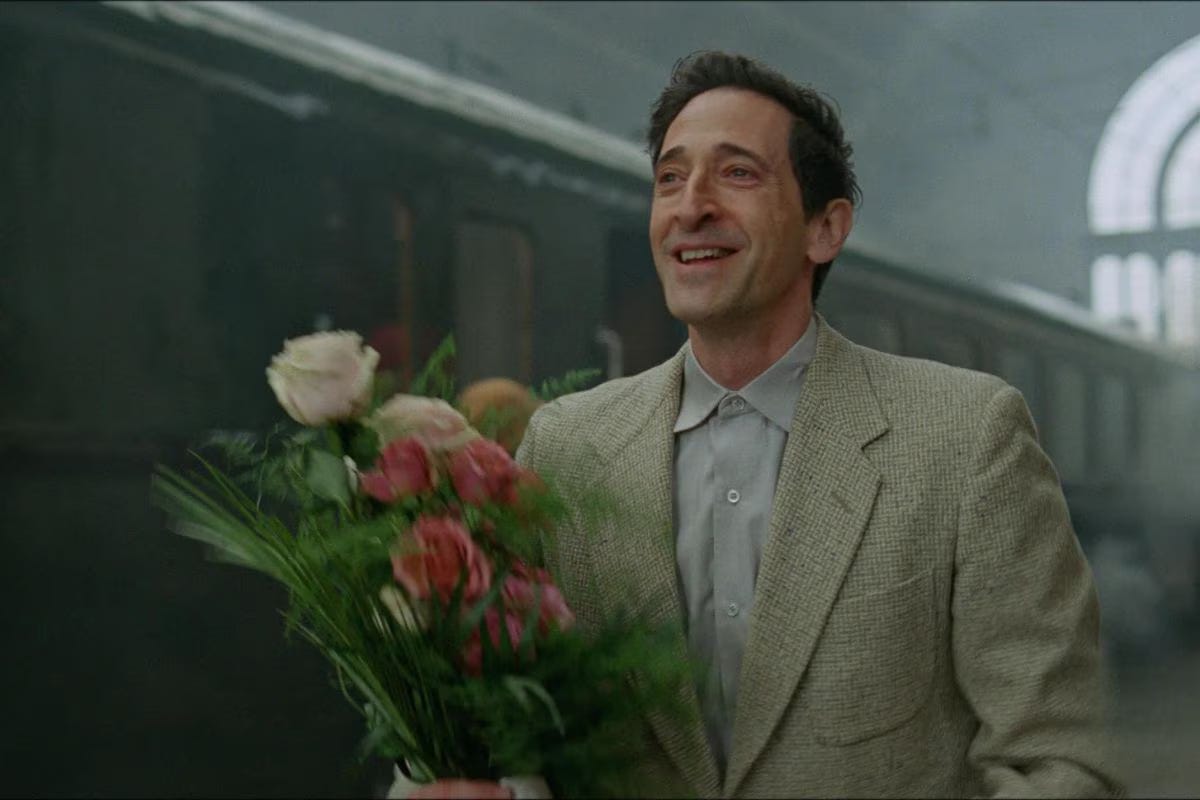Hilarious that many are taking Brady Corbet’s three-and-a-half-hour-with-onscreen-intermission intima-epic The Brutalist as a Classic Hollywood throwback when it’s more a punkish wolf in sheep’s clothing. Hardly a loving riff on Citizen Kane or The Godfather, it’s more accurately Buffalo Bill parading the flayed skin of Elia Kazan’s America America. Corbet has now so fully assimilated the influences of acknowledged mentors Haneke and Von Trier that he’s come up with his own exceedingly entertaining jape: Propulsive awards-bait as dogma-detonating drone warfare.
The post-WWII reinvention and decades-long degradation of fictional Hungarian architect Lázló Tóth (Adrien Brody) moves like a momma-focker from its showstopper of an opening salvo: Lázló emerging Son of Saul-like from the grumbling bowels of a passenger ship to catch an upside-down and sideways view of Lady Liberty. It’s just one of innumerable visual pleasures conjured by Corbet and cinematographer Lol Crawley, who shot the movie in VistaVision, a process not utilized in an American feature since 1961’s One-Eyed Jacks.
Corbet isn’t looking technologically backward without a purpose. Weirdly, the bewitching celluloid haze helps put us very presently in Lázló’s off-groove head-and-heart-space. Rare is the movie that captures just how outside their time a committed artist can be. History passes Lázló by to the degree that when his virilely vampiric benefactor-to-be, Harrison Lee Van Buren (Guy Pearce), shows him photos of the structures he built in Hungary that were presumed destroyed by the Nazi war machine, he comes off both moved and irritated, thrown by the fact that his work is resonating beyond its moment and that, more upsettingly, he is being forced to deal with it. “I did not realize these images were still available,” Lázló mutters, “much less of any consequence.”
Is this Corbet meta-acknowledging his movie’s own Wildean uselessness? He, like Lázló, certainly exudes a public aura of dour pretense. But each of his and co-writer spouse Mona Fastvold’s three features (this, The Childhood of a Leader and Vox Lux) in addition to the excellent 2008 short Protect You + Me also have a mischievousness about them that tempers the reach whenever grasp is exceeded. This is not at all a cautious instinct — if anything, it makes the movies that much more freewheeling and unpredictable, and the thematic takeaways equally slippery and unsettling.
Smart move because The Brutalist takes on a lot — the incestuous relationship between capitalism and art; the American Dream and if you have to be asleep to believe it; the propagandistic co-optation of one’s life’s work by a colonizer nation, et cetera, et cetera, ad nausea. When Corbet buttresses a montage of Lázló attentively living and laboring with a lengthy audio clip of a speech declaring the foundation of Israel, a neon pop-up blaring “Chekhov’s Gun!” might as well appear. The twinkishness-relinquishing star of Thirteen and Thunderbirds has thoughts on Zionist imperialism? Boy-howdy, does he!
Flippancy aside, The Brutalist more than earns its grand statements as well as its impish affect. And it’s certainly easy to take the movie as an A-to-B “great man” spectacle if so inclined. (Though why, I wonder, would you?) The dexterous sparring between Brody and Pearce — the former strenuously working from the inside out, the latter going shamelessly all-surface — has a compellingly curdled romanticism that leads where it disturbingly must. And when Lázló’s displaced wife Erzébet (Felicity Jones) shows up to dominate the movie’s second half, the sense of the film as an Oscar-courting extravaganza that’s been savagely body-snatched only intensifies.
Jones is the one who gets the awards show clip, facing off with both Pearce and a volcanically temperamental Taylor Swift ex in a register somewhere between Rosetta and Real Housewives (for all that, I'd want a little gold statuette too!). But it’s a sneakily cameoing Ariane Labed as the elder incarnation of a Lázló relation who leads this ever-expanding void of a film deep into the abyss, via a jaw-dropping climactic monologue that defiantly explicates everything even as it diabolically explains nothing. Labed’s closing line, quickly followed by an über-sublime “Extend-your-arm-…-Extend-your-middle-finger” needle drop, are the sickest of sick jokes in a film full of them. Dear reader, did I fuckin’ howl.



